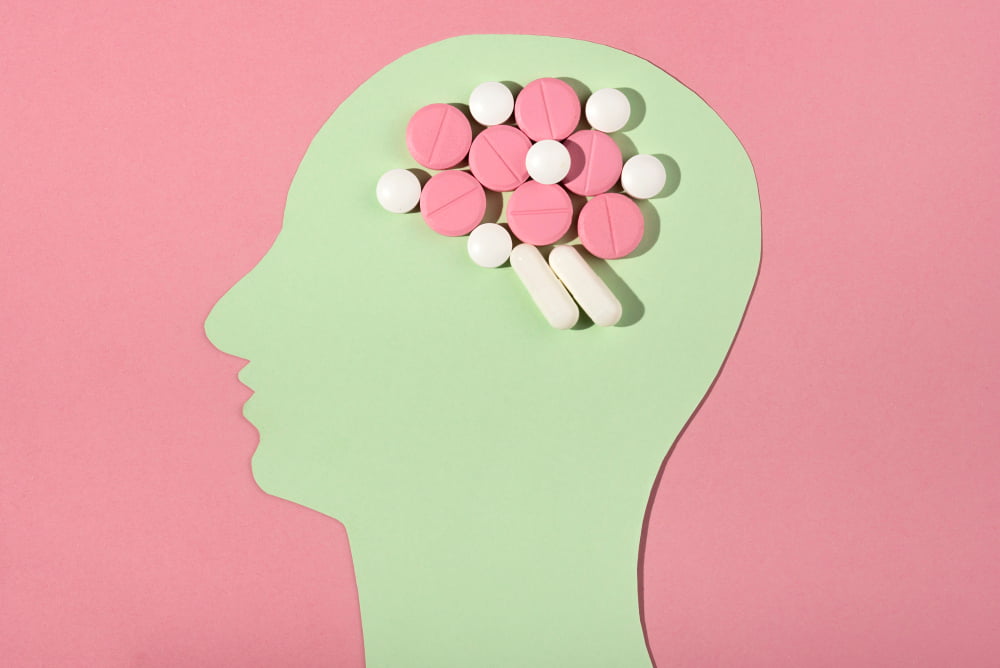Ever forget where you put your keys? Struggle to remember someone’s name? These are just a few signs that your brain function might need a little TLC. Just like the rest of your body, your brain thrives on proper care and nourishment. But did you know that certain vitamins and supplements can give your brain a much-needed boost?
This article dives deep into the world of brain-supporting supplements, exploring the top contenders and their science-backed benefits. We’ll answer your burning questions, like:
- Which vitamins are powerhouses for brain health?
- What supplements can enhance cognitive function?
- Are there natural brain boosters that work?
By the end of this journey, you’ll be armed with the knowledge to make informed decisions about supporting your brain health and keeping your mind sharp.

The All-Star Vitamin: B Complex
There’s no single “most effective” vitamin for the brain, but the B complex takes the gold medal for overall importance. This group of vitamins plays a crucial role in converting food into energy, which is essential for brain function. Deficiencies in B vitamins, particularly B6, B9 (folate), and B12, have been linked to cognitive decline, memory problems, and even depression.
The good news? Getting your daily dose of B vitamins is often as simple as incorporating healthy foods into your diet. Leafy green vegetables, whole grains, legumes, and nuts are all excellent sources. However, if you have dietary limitations or suspect a deficiency, a B complex supplement can be a safe and effective way to ensure you’re getting enough.
Power Up Your Brain with These Vitamins
Beyond the B complex, several other vitamins shine when it comes to brain health:
- Vitamin D: This sunshine vitamin plays a vital role in nerve cell function and communication. Studies suggest low vitamin D levels might be linked to an increased risk of dementia and Alzheimer’s disease. Fatty fish, eggs, and fortified milk are good dietary sources, but supplementation might be necessary depending on your sun exposure and vitamin D levels.
- Vitamin E: This antioxidant powerhouse helps protect brain cells from damage caused by free radicals. Studies suggest it might have a role in preventing age-related cognitive decline. Nuts, seeds, and vegetable oils are rich sources of vitamin E, and supplements are readily available.
Vitamins for a Balanced Mind
While not directly linked to brainpower, certain vitamins play a crucial role in supporting mental well-being:
- Vitamin C: This immune-boosting vitamin also acts as an antioxidant, protecting brain cells from damage. It might also help reduce symptoms of anxiety and depression. Citrus fruits, bell peppers, and broccoli are excellent sources of vitamin C.
- Vitamin B12: Deficiency in this vitamin can lead to fatigue, depression, and difficulty concentrating. It’s particularly important for maintaining the health of the nervous system. Animal products like meat, eggs, and dairy are the primary sources, but B12 supplements are readily available for those following a vegan diet.
Unveiling the Best Brain Booster Supplements
Now, let’s delve into the world of brain booster supplements. Here are some top contenders:
- Omega-3 Fatty Acids: These essential fats are crucial for building and maintaining brain cells. Research suggests they might help improve memory, focus, and even reduce the risk of dementia. Fatty fish like salmon, tuna, and mackerel are excellent sources, but supplements are a convenient alternative for those who don’t eat enough fish.
- Creatine: Often associated with muscle building, creatine also plays a role in brain function. Studies suggest it might improve cognitive performance and memory, especially in older adults.
Important Note: Remember, supplements are not magic pills. They work best when combined with a healthy diet and lifestyle.
The Powerhouse Picks: Strongest Brain Supplements
Strength doesn’t always equate to better. When it comes to brain supplements, the “strongest” option isn’t necessarily the best. It’s crucial to consider the scientific backing and potential side effects of any supplement before adding it to your routine.
Expert Advice: Always consult your doctor before starting any new supplement, especially if you have any underlying health conditions or are taking medications.
Choosing the Right Brain Booster
So, which brain booster should you take? There’s no one-size-fits-all answer. The best choice depends on your individual needs and goals. Here are some factors to consider:
- Scientific Evidence: Look for supplements with strong scientific backing to support their claims.
- Dosage: Follow the recommended dosage on the label and avoid exceeding it.
- Side Effects: Be aware of potential side effects and choose supplements with a low risk of adverse reactions.
- User Reviews: While not a substitute for scientific research, reading user reviews can provide valuable insights into real-life
Beyond Vitamins and Supplements: A Multitude of Brain-Enhancing Options
While vitamins and supplements can play a valuable role, a holistic approach is key to optimizing brain health. Here’s a look at some additional options:
- Multivitamins for Brain Power: Look for multivitamins formulated specifically for brain health. These often contain a combination of B vitamins, vitamin D, vitamin E, and other brain-supporting nutrients.
- Dissecting Neurobion: Neurobion is a popular multivitamin containing B vitamins. While it can address deficiencies and support overall nervous system health, it might not be the most targeted approach for everyone. Consider a multivitamin with a broader range of brain-supportive nutrients if you have specific cognitive concerns.
- Brain Health Capsules: Cracking the Code: Many brain health capsules contain a blend of ingredients like omega-3 fatty acids, choline, and herbal extracts like ginkgo biloba. Research on the effectiveness of these blends varies. Choose capsules with well-studied ingredients and consult a healthcare professional for personalized recommendations.
Do Brain Supplements Deliver? Separating Fact from Fiction
The world of brain supplements can be confusing. Here’s a reality check:
- Evidence-Based Approach: Not all brain supplements are created equal. Look for those with strong scientific backing to support their claims.
- Expert Opinions: Many reputable health organizations advise focusing on a healthy diet and lifestyle before resorting to supplements.
Supercharge Your Brain Function Naturally
Here are some powerful, non-supplemental ways to boost your brainpower:
- Fuel Your Brain with the Right Foods: A balanced diet rich in fruits, vegetables, whole grains, and healthy fats provides the essential nutrients your brain needs to thrive.
- Unlock the Potential of Key Nutrients: Focus on incorporating foods rich in omega-3 fatty acids, B vitamins, vitamin D, and antioxidants into your diet.
- Exercise Your Brainpower: Regularly engage in mentally stimulating activities like puzzles, games, or learning a new skill.
- Prioritize Sleep: Getting enough quality sleep is crucial for cognitive function and memory consolidation. Aim for 7-8 hours of sleep per night.
- Manage Stress: Chronic stress can negatively impact brain health. Practice relaxation techniques like meditation or yoga to manage stress effectively.
Omega-3s: The Brain’s Essential Fat
Omega-3 fatty acids, particularly DHA and EPA, are superstars for brain health. They play a vital role in building and maintaining brain cells, impacting memory, learning, and focus.
- Dietary Sources: Fatty fish like salmon, tuna, and mackerel are excellent sources of omega-3s.
- Recommended Intake: Aim for at least two servings of fatty fish per week. If you don’t eat enough fish, consider high-quality omega-3 supplements.
Minerals for a Mighty Mind
Minerals also play a crucial role in brain function:
- Magnesium: This mineral supports nerve transmission and cognitive function. Leafy greens, nuts, seeds, and whole grains are good sources.
- Zinc: Deficiency in zinc can impair memory and learning. Oysters, red meat, poultry, and nuts are rich in zinc.
The Ultimate Brain Boost: A Multifaceted Approach
The most impactful approach to brain health combines various strategies:
- Essential Vitamins and Supplements: Fill nutritional gaps with targeted vitamins and supplements.
- Lifestyle Tweaks: Prioritize a healthy diet, regular exercise, quality sleep, and stress management.
- Brain-Training Activities: Engage in activities that challenge and stimulate your brain.
Unveiling the “Most Powerful” Brain Pill: A Myth Busted
There’s no single “most powerful” brain pill. A balanced approach that combines targeted supplements, a healthy lifestyle, and brain-stimulating activities is the key to unlocking optimal brain function.
Choosing the Best Brain Supplement: Weighing Your Options
With so many options available, choosing the right brain supplement can be overwhelming. Here’s a helpful approach:
- Consult Your Doctor: Discuss your individual needs and goals with your doctor before starting any new supplement.
- Research is Key: Look for supplements with strong scientific backing and a good safety profile.
- Read User Reviews: While not a substitute for research, user reviews can offer valuable insights into real-life experiences.
Which is the Best Brain Tonic? Unveiling the Reality
While the concept of a magic “brain tonic” is appealing, there’s a lack of robust scientific evidence to definitively crown a single champion. Many traditional brain tonics are herbal concoctions with limited research on their effectiveness for cognitive improvement.
Here’s a breakdown of some commonly available brain tonics:
- Ginkgo Biloba: This herb is a popular brain tonic ingredient, but research on its cognitive benefits is inconclusive. Some studies suggest it might improve memory and focus in older adults, while others haven’t found significant effects.
- Ashwagandha: This adaptogenic herb is known for its stress-relieving properties. While stress management can indirectly benefit cognitive function, ashwagandha’s direct impact on brainpower needs further investigation.
- Bacopa Monnieri (Brahmi): This Ayurvedic herb has been used traditionally for memory enhancement. However, current research doesn’t provide definitive evidence for its effectiveness in improving cognitive function in healthy individuals.
The Bottom Line on Brain Tonics:
Brain tonics might contain some potentially beneficial ingredients, but the overall evidence for their cognitive-boosting effects is weak. Furthermore, the quality and standardization of ingredients can vary greatly between brands.
A Better Approach:
Instead of relying solely on brain tonics, consider a more evidence-based approach:
- Focus on Well-Studied Supplements: Opt for supplements with strong scientific backing, like omega-3 fatty acids or certain B vitamins, to address potential nutrient deficiencies.
- Embrace a Brain-Healthy Lifestyle: Prioritize a balanced diet, regular exercise, quality sleep, and stress management techniques. These lifestyle habits have a well-established positive impact on brain function.
- Challenge Your Brain: Engage in mentally stimulating activities like puzzles, games, or learning a new skill. This keeps your brain active and helps build cognitive resilience.

Frequently Asked Questions
The answer depends on the specific supplement. Some, like omega-3 fatty acids and B vitamins, have shown promise in improving memory, focus, and overall cognitive function. However, research on others is inconclusive.
Vitamins, minerals, and omega-3 fatty acids are generally considered safe for most people when taken at recommended doses. However, it’s always best to consult your doctor before starting any new supplement, especially if you have underlying health conditions or take medications.
There’s limited data on the long-term effects of most brain supplements. Some high-dose supplements might have side effects, so sticking to recommended dosages is crucial. Consulting your doctor for personalized advice is recommended.
This varies depending on the supplement. Some, like omega-3s, might take weeks or months to show noticeable effects. Others might work faster, but the benefits are likely subtle.
Absolutely! Focusing on a healthy diet rich in fruits, vegetables, whole grains, and healthy fats provides your brain with the essential nutrients it needs to thrive. Additionally, omega-3s from fatty fish and nuts offer a natural brain boost.
A balanced diet is key! Focus on incorporating foods rich in omega-3s, B vitamins, vitamin D, and antioxidants. Limiting processed foods, added sugar, and unhealthy fats can further support brain health.
Scientific Backing: Look for supplements with strong research supporting their cognitive benefits.
Your Needs: Are you looking for memory support, focus enhancement, or general brain health maintenance?
Safety Profile: Choose supplements with a low risk of side effects.
Doctor’s Advice: Discuss your options with your doctor for personalized recommendations.
It’s always best to consult your doctor before starting any new supplement, regardless of age. This is especially important for children and pregnant or breastfeeding women.
Yes, some supplements can interact with medications. Always check with your doctor before taking a new supplement to avoid any potential interactions.
The best time often depends on the specific supplement. Some might be better absorbed on an empty stomach, while others might be best taken with food. Following the recommended dosage instructions on the label is key.




